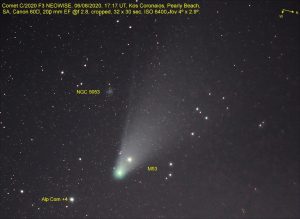2020 August, Kos Coronaios
This comet is a long period comet with a near-parabolic orbit discovered on March 27, 2020, by astronomers during the NEOWISE mission of the Wide-field Infrared Survey Explorer space telescope.
At that time, it was an 18th-magnitude object, located 2 AU (300 million km; 190 million mi) away from the Sun and 1.7 AU (250 million km) away from Earth.
NEOWISE is known for being the brightest comet in the northern hemisphere since Comet Hale–Bopp in 1997. It was widely photographed by professional and amateur observers and was even spotted by people living near city centers and areas with light pollution. While it was too close to the Sun to be observed at perihelion (03 July 2020), it emerged from perihelion around magnitude 0.5 to 1, making it bright enough to be visible to the naked eye. Under dark skies, it could be seen with the naked eye and remained visible to the naked eye throughout July 2020. By July 30, the comet was about magnitude 5, but binoculars were required near urban areas to locate the comet.
For observers in the southern hemisphere, the comet was visible from around the 26th July a couple of degrees above the northern horizon after sunset. At around magnitude +5 it was never going to be visible with the naked eye due to it’s proximity to the horizon shortly after sunset, but it was a reasonably easy target for binoculars as well as small telescopes by the first week in August. Currently at around magnitude +7 it is in the constellation of Virgo, moving into Libra by the end of September 2020.


